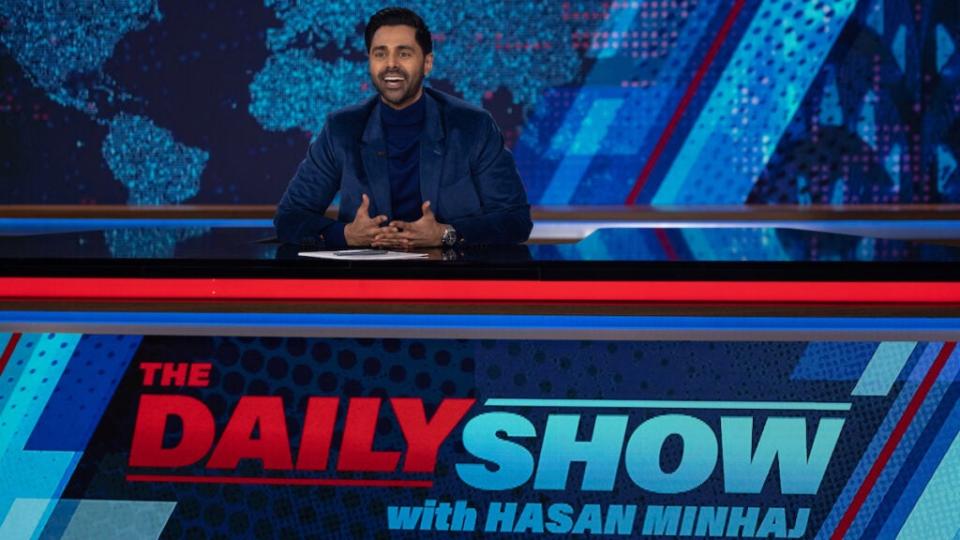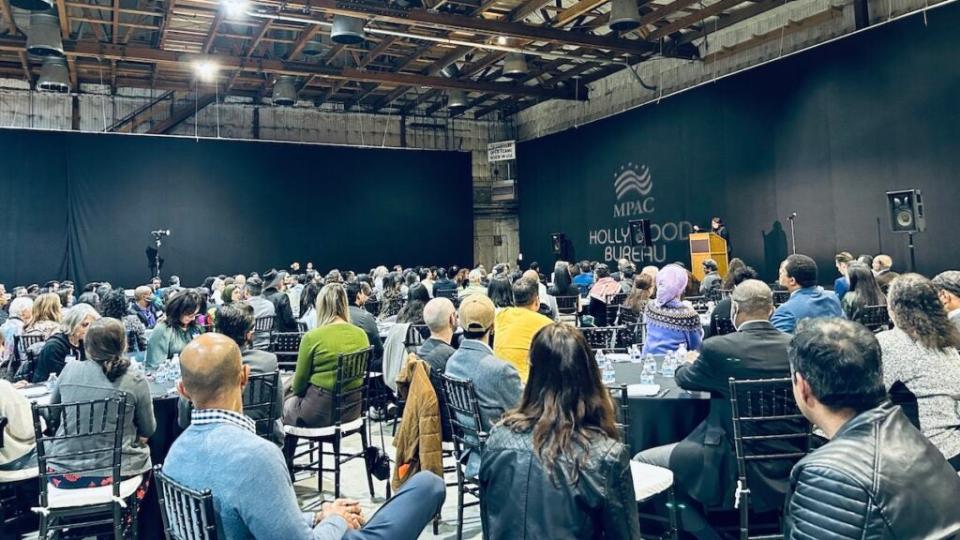Trump’s Travel Ban Kicked Off a Wave of Muslim Stories on TV
You can thank former President Donald Trump for the remarkable rise in TV shows featuring Muslim protagonists – including Hulu’s “Ramy,” Netflix’s “Mo” and Disney+’s “Ms. Marvel,” among others.
Trump’s 2017 executive order banning travel from certain Muslim-majority countries not only fueled the rise of such shows but “led to an unprecedented expansion in [Muslim] representations,” said Evelyn Alsultany, a professor of American Studies and Ethnicity at USC’s Dornsife College and expert on the history of Muslim and Arab representation in the U.S. media.
Shifts in representation often occur in response to a crisis, she said, but this change was dramatic.
“There was something about the Trump presidency that inspired people to act that galvanized not just individuals and organizations but industries like Hollywood,” said Alsultany, whose latest book on the issue is titled “Broken: The Failed Promise of Muslim Inclusion.” “I’ve never seen anything like it before,” she said.
In addition to “Ramy,” “Mo,” and “Ms. Marvel,” Peacock’s “We are Lady Parts” and HBO Max’s “Sort of” are among the high-profile streaming shows that not only feature Muslim protagonists, but were written or made by Muslims in Western countries in recent years.
Also Read:
‘We Are Lady Parts’ Renewed for Season 2 at Peacock
When Trump first aired the idea of a “Muslim ban” in incendiary, Islamophobic language on the campaign trail in 2016, Hollywood celebrities and entertainment-industry executives were among those who registered sharp disapproval — and many were ready to do something about it, which made them receptive to pitches involving more complex Islamic characters.
“All of a sudden, hijab became the new black and that’s when we started to see our stories come through — through this adversity,” said Iman Zawahry, an American Muslim independent filmmaker, whose recent rom-com film “Americanish” was just acquired by Sony, and a lecturer at the University of Florida in Gainesville.
The critically acclaimed Canadian comedy series “Sort Of,” which began streaming on HBO Max in 2021, features a gender-fluid Millennial born into a Pakistani family. And last year, “Mo,” which stars comedian Mo Amer as a Palestinian Muslim refugee living in Texas, also began airing on Netflix. Each of these shows is helping to break Muslim stereotypes one episode at a time.
Initially, it was mostly shows that featured Muslim males, including “Ramy,” starring comedian Ramy Youssef about an Egyptian-American Millennial trying to make his way in a secular society, which started airing in 2019, or Netflix’s “Patriot Act” with comedian Hasan Minhaj, a television talk show that premiered in 2018 and ran until mid-2020. (Minhaj, a former “Daily Show” correspondent, recently guest-hosted that show.)

But as the appetite for Muslim female protagonists grew, “We Are Lady Parts,” a sitcom about an all-female Muslim punk rock band in the United Kingdom, got picked up by Peacock in 2021. Disney+ followed with the “Ms. Marvel” miniseries about a Pakistani girl superhero in 2022.
“We’re starting to see Muslims in a context that has nothing to do with terrorism,” Alsultany said. “We’re finally seeing some examples of Muslims as people, complicated people.”
There have been some missteps along the way. Early on in Fox’s “9-1-1: Lone Star,” for example, Muslims noticed that the actress who plays a Muslim character did not properly prostrate herself in a mosque scene, Alsultany said. And in Netflix’s “Orange is the New Black,” the American Black Muslim character in the series hails from a polygamous family, which feeds into misleading stereotypes, she said.
A drop in the bucket
Muslim and Arab identities have been conflated for most of U.S. media history even though not all Arabs are Muslim and many Muslims are not Arab.
Terrorist-themed dramas depicting them as terrorists rose after the 9/11 terror attacks, but so did the patriotic Muslim or Arab character in TV shows like “Homeland,” “24” and “Quantico.”
Also Read:
How 9/11 Changed Hollywood – And Is ‘Still Grappling’ With the Terror Attacks 20 Years Later
The problem is “you’re still learning about these identities in the context of terrorism – so you’re either good or bad in terrorism,” Alsultany said.
While there are broader representations of Muslims today, it’s not clear whether the current rise is a temporary reaction in response to the travel ban or whether it will be long-lasting, she said. What is clear, however, is the increase in Muslim protagonists and Muslim stories in television – while important – will likely be a drop in the bucket.
Muslims make up a quarter of the world’s population, but were only 1.1 percent of the speaking characters in popular television series from 2018 and 2019 that aired in the U.S., U.K., Australia and New Zealand, according to the report “Erased or Extremists: The Stereotypical View of Muslims in Popular Episodic Series” from the USC Annenberg Inclusion Initiative. Female characters were particularly absent and made up only 31 percent of all Muslim characters.
Also Read:
From Hanukkah to Ramadan, We Need a Little More Than Christmas on Our Screens (Guest Blog)
The 2022 study also found that extremist stereotypes remain prevalent. More than 30 percent of nearly 100 Muslim TV characters evaluated found to be perpetrators of violence, while nearly 40 percent were targets of violent attacks. The authors said they also intend to measure the frequency and portrayal of Muslim characters in more recent years but estimated little if any improvement.
American Muslim actress and voice artist Zehra Fazal said she was honored to play the Muslim mother of a friend of the main protagonist in the Disney Jr. show “Mira Royal Detective” for its episode on Eid al-Fitr, the feast marking the end of the holy month of Ramadan in which Muslims fast from dawn to dusk. But she has also played several on-camera roles that have cast her as a victimized woman in a war-torn Middle Eastern or South Asian country.
“As somebody who is an American born and raised in the Midwest, to play people of that culture, portraying them in these vulnerable states is interesting,” Fazal said. “I hope we continue to see women who look visibly Muslim in positions of agency — positions where they’re not a victim, where they’re actually enjoying their life and thriving.”

Today, there’s a stronger sense of optimism among Muslims connected to the industry that they’re making a difference. The Muslim Public Affairs Council Hollywood Bureau hosted in March a Ramadan break-the-fast meal, or iftar, at the Radford Studio Center in Studio City. The event drew more than 200 people of all faiths. Attendees included industry creatives and executives from companies like Netflix, Disney and Jordan Peele’s Monkeypaw Productions.
For Obeidi, whose bureau works to change the narrative of Muslims in the industry, the event was an opportunity to build bridges and celebrate Muslim talent. It was also evidence to her of the inroads her community is making in Hollywood.
“You’re talking about Muslims who have been vilified by Hollywood doing an iftar out of a major Hollywood soundstage,” Obeidi said. “I think Hollywood is very much open to our stories, our traditions and our cultures now.”

